
Gwenaëlle Verbecque has looked again and again to IATA Training to help her anchor knowledge gained on the job in sound principles, current regulatory frameworks and specialized industry insight.

I always dreamed of being a flight attendant. My stepfather was a purser on Concorde, the transatlantic supersonic airliner, and I wanted to be like him, to travel and see the world. I realized my dream, starting out with regular airlines as crew on larger aircraft, flying out of Paris’s main airports. Later, after I had switched to private jets and presidential aircraft out of Le Bourget, I was looking for a new challenge, that would show people that I was more than what they thought of as just a “waitress on a plane”. When the opportunity arose to become a safety instructor, as well as purser, on an A319 ACJ, I was able to highlight my experience with larger aircraft and move into the field of safety.
In 2010, I relocated to Gabon to become cabin manager on the presidential 777-200 for diplomatic flights, operated by Afrijet. When the aircraft was refurbished, I was responsible for managing its entry into service. I carried out the safety audits and transferred knowledge to the military crew for the presidential flights. By the time Afrijet started operating regular aircraft in 2016, I was already Deputy SMS Manager, and it was obvious to me that I needed to cement and augment the knowledge I had gained on the job with some formal training.
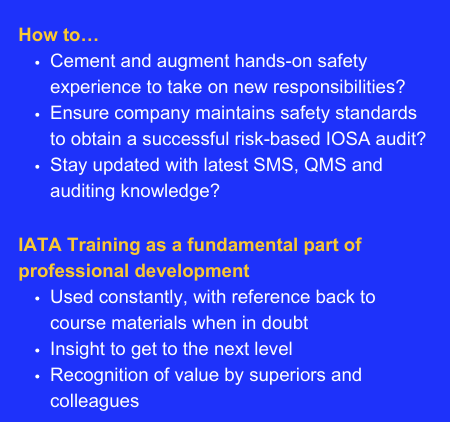
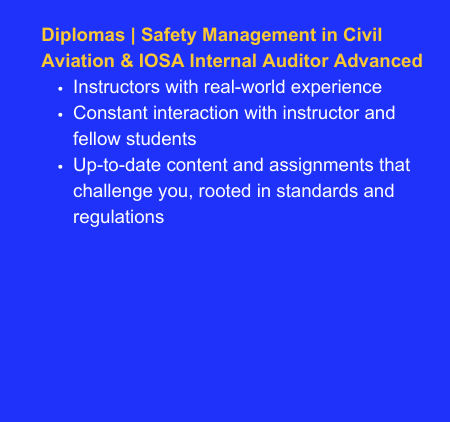
The Safety Management in Civil Aviation diploma gave me a global overview, with four courses: Human Factors in Aviation, Safety Management Systems (SMS) for Civil Aviation, Managing the Safety Oversight Function, and Incident / Accident Prevention and Investigation. When I became SMS Manager for the company in 2017, I added Fatigue Risk Management Systems (FRMS) to complete my knowledge and be able to set out everything for safety from scratch. That involved me talking to every sector of our 320-person company, including ground operations and maintenance, cargo, cabin and flight operations. And that meant not only did I have a global view of safety, but I also gained a global view of the company, which was a great asset when the time came to prepare for IOSA.
We were first certified in 2020, and we renewed twice. Then risk-based IOSA (RBI) was introduced. RBI is a very big job, but we are a small team of seven people: three in safety, three in quality, and me. Unlike big airlines that can dedicate people solely to the task, we have to do our daily jobs as well as prepare. And we only have a year. We’re very motivated and there are more of us than when we requested the first certification, but we need to be efficient, and so I turned once again to IATA for training in this very specific area, and found the IOSA Internal Auditor (IIA) Advanced Diploma.
The diploma consists of five required courses: Aviation Internal Auditor, IOSA Airline Auditor Training, Quality Management (QMS) for Airlines, Risk-Based IOSA Airline Training, and Safety Management Systems (SMS) for Airlines, and one elective course. I chose Aviation Lead Auditor. By doing the diploma, I would not only be trained in preparing for risk-based IOSA, but be sure that my knowledge in safety and quality management, as well as auditing, was fully up to date; my past training experience with other entities has shown me that IATA always uses the latest standards and regulations in its courses. Our CEO agreed and I signed up.
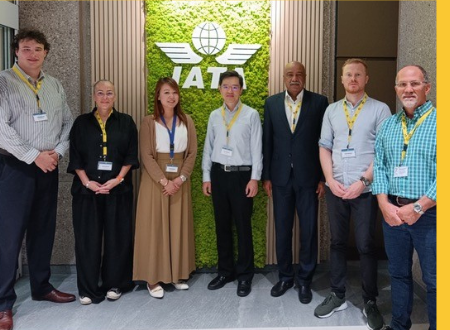
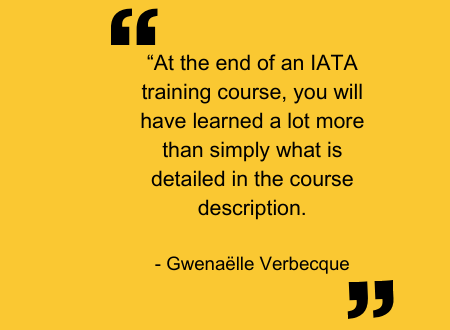
Completing the IATA Special Cargo Handling Diploma in August 2022 enabled me to obtain a Pharmaceutical and Healthcare specialist role with a major name in logistics, just a few months later. The diploma helped me get the attention of employers, and I was able to hit the ground running and start handling shipments for major customers that provide vaccines, and life-saving narcotics and controlled drugs for hospitals, almost right away. It took only a couple of weeks to onboard me. Pharmaceutical and cold chain operations are, for sure, one of the more delicate and complex segments of cargo, requiring strong holistic understanding, and high attention to detail. Having completed the Temperature Controlled Cargo Operations course made me able to contribute fully to the four-person specialist team very quickly.
The knowledge I acquired from the IATA Training courses helped me to analyze and predict the potential risks associated with a shipment, and tailor the appropriate solution for the client, to ensure that patients get their medications in time, with the optimum quality. It’s really helpful to be able to refer back to the course material on solutions, and find the perfect one for the situation. But the most useful aspect for me was the real-life case study on an unsuccessful project, with a class exercise on preventive and corrective actions. There are often unforeseen difficulties in logistics, and I draw on that exercise and how it can be turned into a successful outcome.
After 20 months, I am now leading the department and, without a shadow of a doubt, IATA has been key to this achievement. I am sure that I would not have been successful in my position and obtained my promotion without the knowledge that I acquired from the IATA Training courses. Now that I have achieved my goal of working in special cargo, and am well on my way back to the management level I had before, I want to progress further in the sector. I intend to do the Pharmaceutical Handling Diploma to get more insights on cold chain management. Pharma is definitely more about quality than cost, and I am aiming to be a lead quality investigator. I will probably also do more training on dangerous goods, as some pharmaceuticals are classed as dangerous goods.
As before, I’ll continue to invest my own money in my professional development, so I can choose my own career path and not be obliged to provide my employer with a return on their investment. I also want to be sure of the quality of the training I’m getting. It’s important to me to do it with the industry leader, and cost is not a factor.
I would definitely recommend IATA Training to anyone in the industry. It’s a sound investment. It helps you stand out, shows you’re capable, and that you invest in yourself. It’s also a reassurance for employers that you can be operational rapidly. I came to Canada from a different part of the world, and had to take a step down. Now I am in demand as a specialist, have shown my worth in a supervisory role, managing people, customers, partners and systems, and I have many options for my career progression. IATA Training is a sound investment.
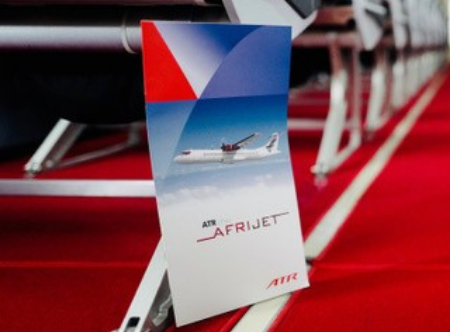
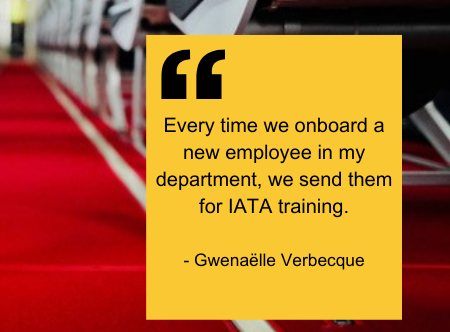
Everything I’ve learned, I use. I use my SMS knowledge every day, my QMS knowledge most of the time, and my auditing knowledge every time I audit. Plus, my IATA training has given me insight. For example, when I was asking people questions during an audit, I was a bit harsh, which made people reply in ways I wasn’t expecting. The training taught me how to ask questions to elicit the responses I need, so I can help people to reach our goals. That’s why I want my people to do the IATA Aviation Internal Auditor and Aviation Lead Auditor training. Every time we onboard a new employee in my department, we send them for IATA training. How much of what I learn with IATA Training will help me in my career?
With the IOSA Internal Auditor Advanced Diploma, which I completed in 2024, I’ve experienced six training courses, and therefore six instructors, and I’ve learned from watching them how to observe behavior and keep people engaged when I train my own people in safety and quality. My aim is to pass on what I’ve learned to my department so they can also actively contribute to our risk-based IOSA recertification.
Over the years, and the IATA training courses I’ve requested and done, my CEO has seen the value of the training for me personally, and what we’ve accomplished with it. He has known me for almost twenty years now, and has seen me grow in the industry, grow within the organization. And he has recognized that growth by rewarding me with more responsibilities and trust. I’m now compliance director.
It’s not always easy for me to realize how far I’ve come, however. A colleague of mine recently remarked that I have become stronger and more decisive, and that is no doubt true. But I sometimes still have doubts. When that happens, I go back to my training and the documentation we received, which I know I can rely on and is so easy to use. However my career evolves, perhaps more specifically towards IOSA, I know that IATA training will continue to be a fundamental part of my professional development.
Download the outline to explore the diploma, its objectives and key topics.